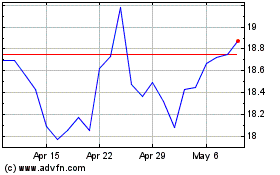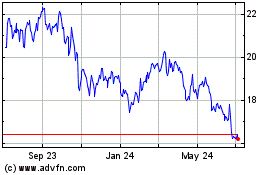By Paul Ziobro and Richard Rubin
Mattel Inc., Hasbro Inc. and other U.S. toy makers are bracing
for an overhaul of the U.S. tax code that is likely to hit
especially hard an industry long reliant on overseas labor to
manufacture Barbie dolls, Nerf guns and Hot Wheels cars.
A proposal to apply a border adjustment to the U.S. corporate
tax would strip toy makers of the ability to deduct the cost of
imported goods from their profits, potentially forcing major price
increases. The proposal, still in early stages, aims to cut tax
rates and keep jobs in the U.S. But the implications are
challenging for an industry that sells many of its products in the
U.S. while producing nearly all of them overseas.
Hasbro and Mattel both generate about half of their revenue
domestically but roughly 95% of Hasbro products and 100% of
Mattel's are made overseas, said Timothy Conder, a toy-industry
analyst at Wells Fargo.
Other groups such as big-box retailers who mostly sell goods
made overseas, are also on guard about the tax. But it could be
particularly costly for U.S. toy companies: Their home market is
their biggest in terms of sales, but with an average manufacturing
cost of $10 per toy, the U.S. isn't a cost-effective place to
produce them.
Mr. Conder estimates that the proposed tax change, under a
worst-case scenario, could lower toy maker Mattel's 2017 earnings,
which he forecasts to be $1.87 a share, by as much as 56 cents, and
ding Hasbro's 2017 estimated profit of $4.76 a share by 62
cents.
Mattel, based in El Segundo, Calif., declined to comment.
Hasbro, in Pawtucket, R.I., didn't respond to requests for
comment.
The border adjustment, part of the Republicans' plan for a
revamped tax system, would apply taxes based on where a product is
sold rather than where it is made or where the maker's operations
or executives are based. Imports couldn't be deducted as a cost of
doing business, while exports would be exempted.
For instance, if a company imports $1 million of foreign-made
toys, spends $500,000 on domestic costs and sells the products for
$2 million, it would only be able to deduct the $500,000 in local
costs under the proposal. Thus, it would pay taxes -- at the
proposed lower corporate tax rate of 20% -- on $1.5 million. A
similarly situated company now would deduct all the costs and pay
35% in taxes on just the $500,000.
Economists say that the tax change would help push up the dollar
-- which would in turn lowering the cost of imports and help to
offset the extra taxes.
According to Douglas Holtz-Eakin, a Republican economist, some
of importers' concerns are overblown, and they aren't factoring in
the benefits they would get from stronger economic growth and the
rising dollar. Companies and analysts looking only at what the
corporations pay in taxes are analyzing the plan incorrectly, he
said.
"Your cost of doing business won't change," Mr. Holtz-Eakin
said. "It will consist less of the cost of imports, which will be
cheaper, and more in taxes.
But large importers doubt that will happen as smoothly as
projected. The tax code has long allowed companies to deduct costs
for business purposes without a distinction between domestic and
foreign goods.
Importers are fighting the still-developing plan in Washington,
and Republican senators and the incoming administration of
President-elect Donald Trump haven't embraced it. House GOP
members, though, see it as a key pillar of their proposal, because
it provides roughly $1 trillion over a decade to offset proposed
corporate tax-rate cuts.
U.S. toy makers decamped to Asia decades ago for its cheaper
labor and manufacturing. Companies refined their operations over
the years as their design and engineering capabilities improved,
and modern highways and ports proliferated in China, making it
easier for companies to move raw materials and finished goods
around the world.
"It really morphed into what you would call the toy industrial
complex," said Richard Gottlieb, founder of Global Toy Experts, a
consulting firm, of the production facilities in China. "You have
something of a scale that's not repeatable in the world."
Some toy makers warn that attempting to bring it back to the
U.S. would be an expensive undertaking. Isaac Larian, chief
executive of MGA Entertainment Inc., the Los Angeles-based maker of
Bratz dolls and other toys, said that moving production
domestically would force the company to triple its prices.
"U.S. consumers will not accept it," he said in an email.
Mr. Larian said his company does make some products for its
Little Tikes line in a Hudson, Ohio, factory, and it has invested
millions in new machinery to ramp up its output there. He added,
however, that retailers and consumers are reluctant to pay more for
"Made in the U.S.A." products.
The Toy Industry Association, the industry's main trade group in
the U.S., has been working with other trade associations that rely
on imports in an attempt to sway Congress to drop the
border-adjustment tax proposal, emphasizing that the $25 billion
toy industry supports nearly half a million American jobs.
If that doesn't work, the New York-based association has
promised to fight.
"We are fully prepared to work productively or be a royal,
boisterous, media-friendly pain in the backsides of people who
would take away children's happy birthdays, steal Christmas and
destroy quality U.S.-based jobs," its president, Steve Pasierb,
wrote last month in his year-end letter to members. "And no one
wants to have to explain to their children why Santa was put out of
work."
Write to Paul Ziobro at Paul.Ziobro@wsj.com and Richard Rubin at
richard.rubin@wsj.com
(END) Dow Jones Newswires
January 11, 2017 09:14 ET (14:14 GMT)
Copyright (c) 2017 Dow Jones & Company, Inc.
Mattel (NASDAQ:MAT)
Historical Stock Chart
From Mar 2024 to Apr 2024

Mattel (NASDAQ:MAT)
Historical Stock Chart
From Apr 2023 to Apr 2024
